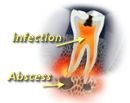 When the nerve of a tooth becomes infected, your Houston dentist may recommend a root canal treatment in order to save the tooth. How do you know if you have an infected tooth? Some of the signs are heat and cold sensitivity, swelling and pain, or a bad taste in your mouth. Or, you may experience no symptoms at all and not realize that you have a dental problem.
When the nerve of a tooth becomes infected, your Houston dentist may recommend a root canal treatment in order to save the tooth. How do you know if you have an infected tooth? Some of the signs are heat and cold sensitivity, swelling and pain, or a bad taste in your mouth. Or, you may experience no symptoms at all and not realize that you have a dental problem.
The white outside portion of a tooth is called the enamel. Inside the enamel is another hard layer, the dentin. There’s a small chamber at the center of the dentin called the pulp chamber. Inside the pulp chamber is the tooth pulp, a soft tissue made up of nerves, arteries, and veins. The pulp extends from the pulp chamber all the way to the tip of the root through a narrow channel called the root canal.
In general, teeth in the front of the mouth have only one root canal, while teeth in the back have two, three or four root canals.
How do teeth become infected?
Deep cavities allow germs to get into the pulp chamber. These germs cause infection, and the pulp dies. The pus from the infection eventually builds up at the root tip and makes a hole in the bone. This is called an abscess.
A blow to a tooth may also cause the pulp to die and then become infected. An infected tooth will  never heal on its own, and as it gets worse, it will continue to be a source of infection that weakens your immune system. This can affect your entire body. This damage to the bone and the swelling inside the bone can also be excruciatingly painful, and even life-threatening. Years ago, an infected tooth would have to be extracted, but today, your Houston dentist can save your tooth with root canal treatment.
never heal on its own, and as it gets worse, it will continue to be a source of infection that weakens your immune system. This can affect your entire body. This damage to the bone and the swelling inside the bone can also be excruciatingly painful, and even life-threatening. Years ago, an infected tooth would have to be extracted, but today, your Houston dentist can save your tooth with root canal treatment.